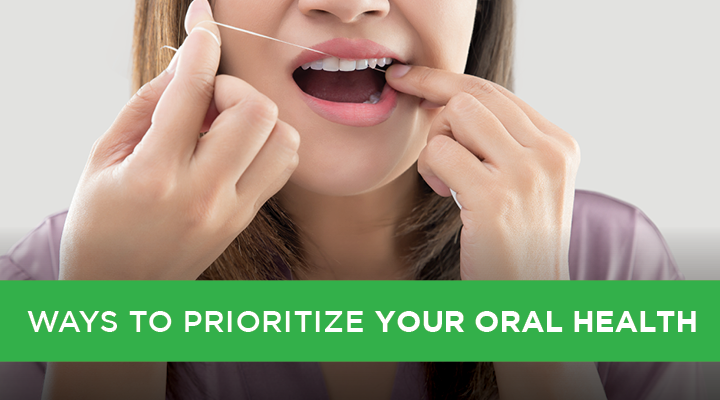
Did you know June is Oral Health Month?
Taking care of your oral health doesn’t need to be difficult. Simple changes in your everyday life can help keep your smile healthy.
Easy ways to prioritize your oral health
Be conscious of your diet
A consistent and nutritious diet can benefit your oral health as well as your overall health. Here are some tooth-friendly options to consider:
- Fruits and vegetables: Fruits and veggies that contain fiber can clean your teeth and gums as you eat them. Apples, pears, carrots, and celery all help keep your teeth clean and provide valuable nutrition to your diet.
- Dairy products: Things like cheese, yogurt, and milk can help your body create more saliva, provide a needed source of calcium, and can help with tooth enamel. Enamel is the hard, protective layer that covers the outer portion of the tooth. Over time the enamel can be weakened by eating and drinking acidic foods, grinding teeth, certain medications, and more. This may lead to oral health problems such as tooth decay or erosion. Consuming dairy products has been found to decrease the loss of enamel and help rebuild it.
- Drinks water that contains fluoride:. If you drink water from your tap, you are likely receiving the benefits community water fluoridation, or the addition of small amounts of fluoride in water. Fluoride is a naturally occurring mineral that is found in water, plants, soil, and rocks. According to the Centers for Disease Control and Prevention, “fluoride helps to retain and return the minerals to tooth surfaces, preventing cavities from forming.” Currently, more than 200 million Americans have access to water supplemented with fluoride.
Remember to read labels when grocery shopping to avoid buying food with excess sugars that may damage your teeth.
Now that we’ve looked at some tooth-friendly foods, here are foods that you should try to avoid or consume in moderation:
- Candy: Not all sweets are created equal, and it’s best to avoid sticky, sour, and long-lasting candies because they’re trouble for your oral health. Bacteria that live in your mouth can metabolize sugars and produce acids that eat away at the hard tissues on your teeth. This demineralization can lead to cavities, tooth decay, and other problems.
- Starchy foods: Starchy foods, such as breads or chips, can sometimes get stuck in the grooves of your teeth. If these particles are not removed by brushing and flossing, they can lead to plaque buildup and an increased risk of tooth decay, according to a study from the Pediatric Dentistry Journal.
- Alcohol: According to a study from the National Library of Medicine, alcohol causes a decrease in the secretion of saliva as well as the electrolyte concentration, which can lead to dry mouth. Chronic dry mouth can cause discomfort and negatively impact an individual’s quality of life. When consuming alcohol, remember to drink plenty of water.
- Carbonated drinks: While sparkling waters may not be as bad for your teeth as you might think, carbonated soft drinks have the potential to be. That’s because of the added sugar and acids that can cause cavities and damage tooth enamel. We recommend limiting soda consumption to protect your enamel.
Only use your teeth for chewing
The enamel on your teeth is one of the toughest substances in your body, and it’s crucial to maintaining a healthy mouth. But that doesn’t mean you should use your teeth like a Swiss Army knife. Don’t use them to chew ice or cut things like scissors, open bottles, or other packaged items.
The best way to protect your enamel is to use your teeth to chew food, pronounce words, and smile. Teeth are not tools.
Use protective gear when playing sports
Good oral health includes considering the potential for teeth and mouth injuries when participating in sports, particularly those with contact or high speeds, and wearing a mouthguard. According to a 2019 systematic review and meta-analysis, athletes who wear mouthguards are “82% to 93% less likely to suffer dentofacial injuries.”
Here are some sports where you should wear a mouthguard:
- Skiing
- Snowboarding
- Football
- Basketball
- Surfing
- Skateboarding
- Motocross
- Mountain biking
- Lacrosse
- Hockey
Have a consistent oral health routine
Keeping a consistent oral health routine should be second nature. This includes brushing your teeth for two minutes twice a day, flossing once per day, and visiting your dentist regularly for cleanings and checkups.
We get it. Brushing for two minutes (and flossing) might seem like an eternity, but it’s essential to ensure each tooth is cleaned correctly, and your mouth is free from cavity-causing debris and bacteria.
Dental visits are just as important and should occur twice yearly (every six months). Your dentist can clean plaque in unreachable places and check for signs of cavities, tooth decay, and even oral cancer and other diseases.
If you or a loved one is scared of the dentist, try these tips to ease dental anxiety.
As you can see, there are many ways to prioritize your oral health, including watching what you eat, only using your teeth for chewing, wearing protective equipment during sports activities, and maintaining a consistent oral health routine.
To learn more about your oral health, check out this blog on Life with Unhealthy Teeth.

